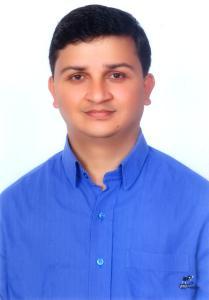Prakash Acharya

Prakash Acharya is an instructor and a Ph.D. student in Mass Communication-Journalism at the E.W. Scripps School of Journalism, Ohio University, enrolled in spring 2022-23. A journalism faculty at Tribhuvan University (TU), Nepal, for 17 years, Acharya has taught various journalism courses – political communication; advanced reporting; media law and ethics; media research; and public relations and advertising -- for graduate and undergraduate levels at the TU. Currently, he is teaching editing course for undergraduate students at the Scripps school. He is the recipient of Robert L. and Teri W. Gerbig Graduate Scholarship in Journalism from the school.
He served as an active journalist in Nepal’s leading daily newspapers: Special Correspondent for the English daily: The Himalayan Times (2008-2017); Senior Reporter for the English daily, The Rising Nepal (2006-2008); and Reporter for vernacular Gorkhapatra daily (2000-2006). His stories revolved around sharing and shaping political agendas in political, social, and developmental affairs. As a political journalist, he has closely observed Nepal’s political milestones since 2000 and has covered them in different media outlets. Additionally, he developed an insight into the significance of communication during conflicts, chaos, and social transformations. He personally reported the entire royal family massacre in 2001, which eventually led to the establishment of a republic system in Nepal; and followed the peace process that brought various rebellion forces to the negotiation table in 2006 and afterwards; and stories about the abolition of the centuries-old monarchy in 2008. He routinely covered the seven-year constitution-making process that delivered the new constitution in 2015 in Nepal.
As a researcher, Acharya is interested in media and social change. Specifically, he wants to
explore the role of actors from journalism, politics, and development in shaping meaning through their rhetoric. For a UNESCO-funded project in 2012 on “Media and the Nepali Public”, he, as one of the researchers, contributed to the advancement of knowledge of the media as a discipline of social change. In a research fellowship granted by Alliance for Social Dialogue and supported by the Open Society Foundation in 2013, he explored the problems and prospects of media policy-making. His study observed how the making and implementation of media policies are affected by certain factors like “the lack of research-based policy formulation, a true engagement of policy stakeholders, evaluation and monitoring”. His research on the “Role of Communication in Poverty Reduction in Nepal” in 2018 found that an interest-free loans support program targeted at deprived communities had negligible impact due to low motivation and knowledge among the people. This was due to a lack on the part of the government, civil society, and media to inform, educate, and motivate the target group. In the fellowship granted by the Poverty Alleviation Fund, he realized the possible application of the “citizen-science” approach in conducting research in underprivileged groups of remote areas. Many other research works conducted by students under his supervision ranged from prospects and problems of public communication that demand effective communication for social transformation.
Acharya earned a Master’s Degree in Journalism and Mass Communication from Tribhuvan University, Nepal, in 2004.